May 31, 2025 | 07:50 GMT +7
May 31, 2025 | 07:50 GMT +7
Hotline: 0913.378.918
May 31, 2025 | 07:50 GMT +7
Hotline: 0913.378.918
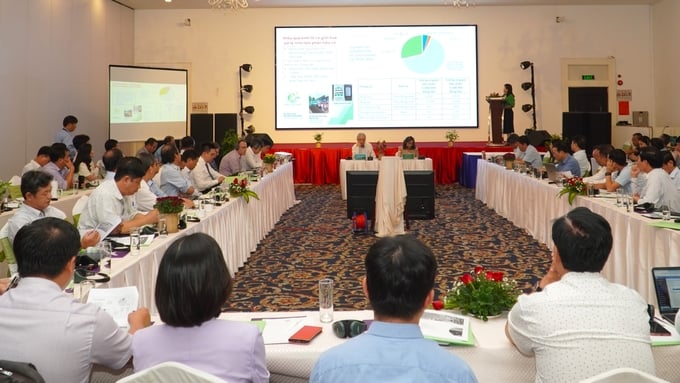
The event gathered the participation of policymakers, experts, international organizations, representatives of the Department of Agriculture and Rural Development of 13 provinces and cities in the Mekong Delta, businesses and cooperatives related to Vietnam's rice industry. . Photo: Kim Anh.
On June 7, the International Rice Research Institute (IRRI) collaborated with The Vietnam Rice Industry Association (VIETRISA) to hold a workshop on the topic of "Developing a circular economy in rice production and processing."
Nguyen Cao Khai, the Director of Thuan Tien Agricultural Service Cooperative in Vinh Thanh district, expressed his concerns about farmers burning straw in the fields immediately after the harvest. This cooperative is the first to conduct a high-quality rice project covering 1 million hectares in Can Tho city. It is often regarded as the most efficient method for quickly euthanizing stubbles, diseases, or any residual rice seeds in the field.
Thanh An commune is characterized by its adjacent rice fields, which pose a significant risk of fire spreading across vast areas if one field is set ablaze. Lately, members of the commune have been actively engaged in diverse training programs and practical surveys focused on circular production models for the collection of straw. Nevertheless, Mr. Khai maintains that the local implementation remains arduous. Firstly, the machinery fails to fulfill the demand, and secondly, the expenses associated with renting the machines and transporting the straw are rather high. However, there is currently no purchaser for the straw once it has been compressed into bales and taken away from the fields.
The Department of Crop Production (MARD) reports that rice production in the Mekong Delta yields around 24.4 million tons of straw each year. However, a mere 30% of this straw, which is around 7.4 million tons, gets gathered. Seventy percent of the remaining waste is disposed of through burning or burial in fields by farmers, resulting in environmental damage and a rise in greenhouse gas emissions.
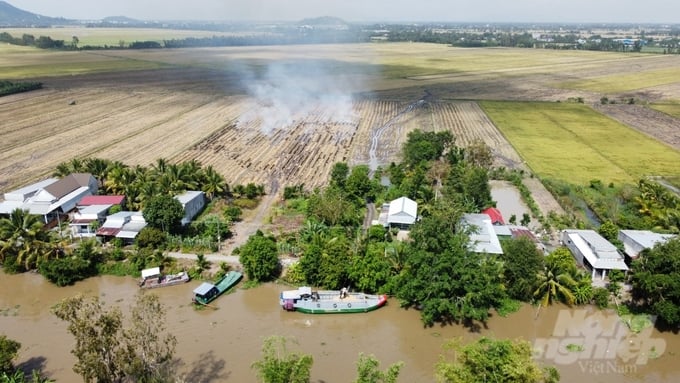
Field burning is a traditional practice of farmers destroying straw after each rice harvest. Photo: Kim Anh.
According to Mr. Le Duc Thinh, the Director of the Department of Cooperative Economy and Rural Development (MARD), the drawbacks of implementing a circular economy have not been adequately resolved. The Thuan Tien Cooperative is currently facing challenges that are typical obstacles in the development of a circular economy for the rice value chain. These issues highlight the need for a change in the approach to mechanization.
The agriculture industry should prioritize a shift in strategy for farmers, transitioning from providing individual households with machinery to adopting shared equipment. Mr. Thịnh observed that agricultural machinery in Vietnam is now being utilized at less than two-thirds of its capacity, resulting in a product lifecycle that only reaches approximately 60% of its potential.
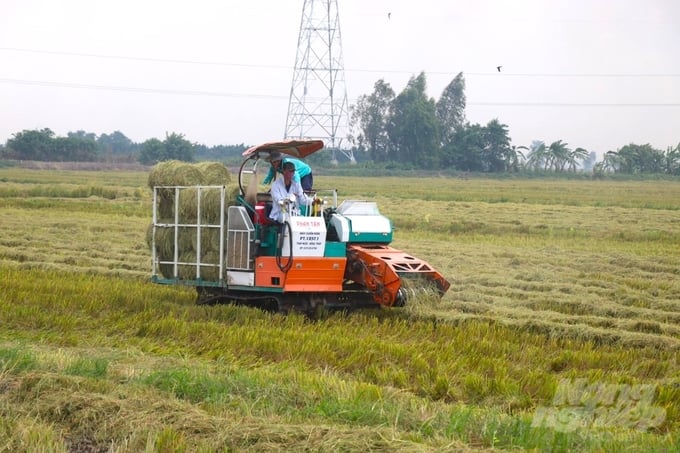
Only about 30% of rice straw in fields in the Mekong Delta is collected. Photo: Kim Anh.
By effectively utilizing the by-products and waste materials generated during rice production, it is possible to transform them into valuable resources that may be used to create a wide range of high-quality products, thereby establishing a diverse ecosystem. According to Mr. Le Thanh Tung, Deputy Director of the Department of Crop Production, Vietnam has a substantial chance to establish a circular agricultural economy due to its many by-products.
This opportunity entails promoting the development of products such as energy, biochar, biosilica, and materials for industrial processing derived from rice husks. In addition, straw by-products can be utilized for mushroom cultivation, as well as for creating livestock feed, biological bedding, and organic fertilizers.
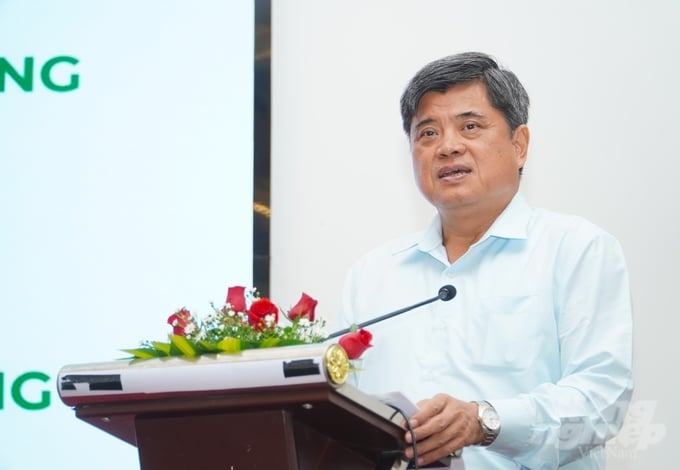
Deputy Minister of Agriculture and Rural Development Tran Thanh Nam affirmed that within the scope of the 1 million hectares of high-quality rice project, the Mekong Delta region can completely implement circular economic development from straw and rice husk by-products. Photo: Kim Anh.
Close collaboration among all stakeholders, including policymakers, scientists, enterprises, and farmers, is essential for the effective establishment of circular economy models in rice production and processing.
In order to do this, Deputy Minister of Agriculture and Rural Development Tran Thanh Nam proposed that VIETRISA engage enterprises in seed production, fertilizers, agricultural materials, and rice purchases to contribute to the development of standardized circular economy models. Simultaneously, the Deputy Minister suggested that IRRI and VIETRISA join forces to offer technical assistance in the creation and execution of circular economy models for the one-million-hectare high-quality rice project.
MARD will develop procedures and policies to promote the circular agricultural economy as a whole, with a specific focus on the rice sector. The Departments of Agriculture and Rural Development in the Mekong Delta provinces have the responsibility of guiding provincial and municipal People's Committees about the establishment of circular economy models. These models are based on the one-million-hectare high-quality rice project and aim to be implemented on a larger scale.
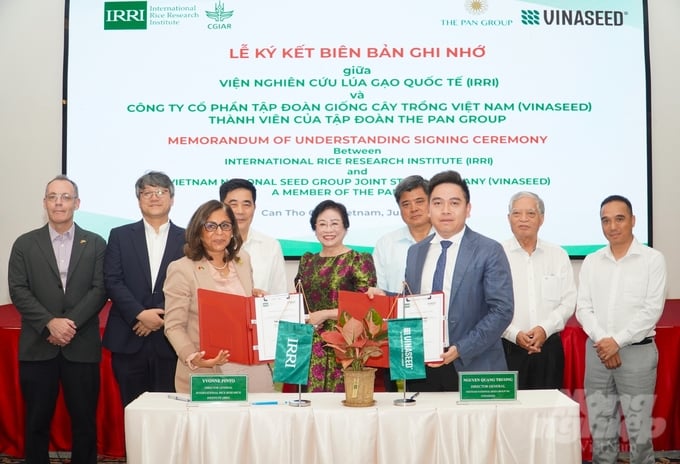
The International Rice Research Institute (IRRI) and Vietnam Seed Group Joint Stock Company (Vinaseed) signed a cooperation agreement on science, technology, development and commercialization of technologies. Photo: Kim Anh.
IRRI and the Vietnam Seed Corporation (Vinaseed) have signed a scientific and technological collaboration agreement. The purpose of this partnership is to develop and commercialize high-yield rice varieties that are resilient to climate change and have enhanced health benefits.
The collaboration entails offering instruction and enhancing capabilities in the domains of gene editing, genetics, and breeding. It also involves exchanging genetic resources and materials that are resistant to pests and diseases for additional evaluation, breeding, and adjustment to suit Vietnam's production conditions. Furthermore, the partnership encompasses researching and enhancing undesirable characteristics in specific superior varieties, as well as creating novel rice cultivars.
Translated by Linh Linh
/2025/05/29/5625-12-214801_567.jpg)
(VAN) Provincial mergers in the Mekong Delta promise to streamline administration, expand inter-provincial raw material areas, and foster close linkages in agricultural value chains, benefiting both businesses and cooperatives.

(VAN) Merging Mekong Delta provinces contributes to the expansion of agricultural raw material areas, addressing previous constraints caused by provincial boundaries. Additionally, this expansion will reduce costs and strengthen linkages between businesses, cooperatives, and farmers.
/2025/05/29/1043-2-153730_145.jpg)
(VAN) The Government's policy to merge provincial-level administrative units opens up major opportunities for the Mekong Delta region to reshape its agricultural development strategy toward large-scale production, effective regional linkages, and sustainability.

(VAN) The mutual export of agrifood products between the European Union (EU) and the United Kingdom (UK) must occur again without certification, border controls or other red tape. This was agreed at the UK-EU summit.
/2025/05/22/5121-2-173645_677.jpg)
(VAN) NBSAP Tracker identifies strengths and areas for improvement in the National Biodiversity Strategy, based on each region’s priorities and capacities.

(VAN) The draft amendment to the Circular on rice export trading stipulates a periodic reporting regime for rice exporting enterprises.

(VAN) Dong Thap farmers attained an average profit margin of 64% during the summer-autumn 2024 crop (first season), while An Giang and Kien Giang farmers followed with 56% and 54%, respectively.